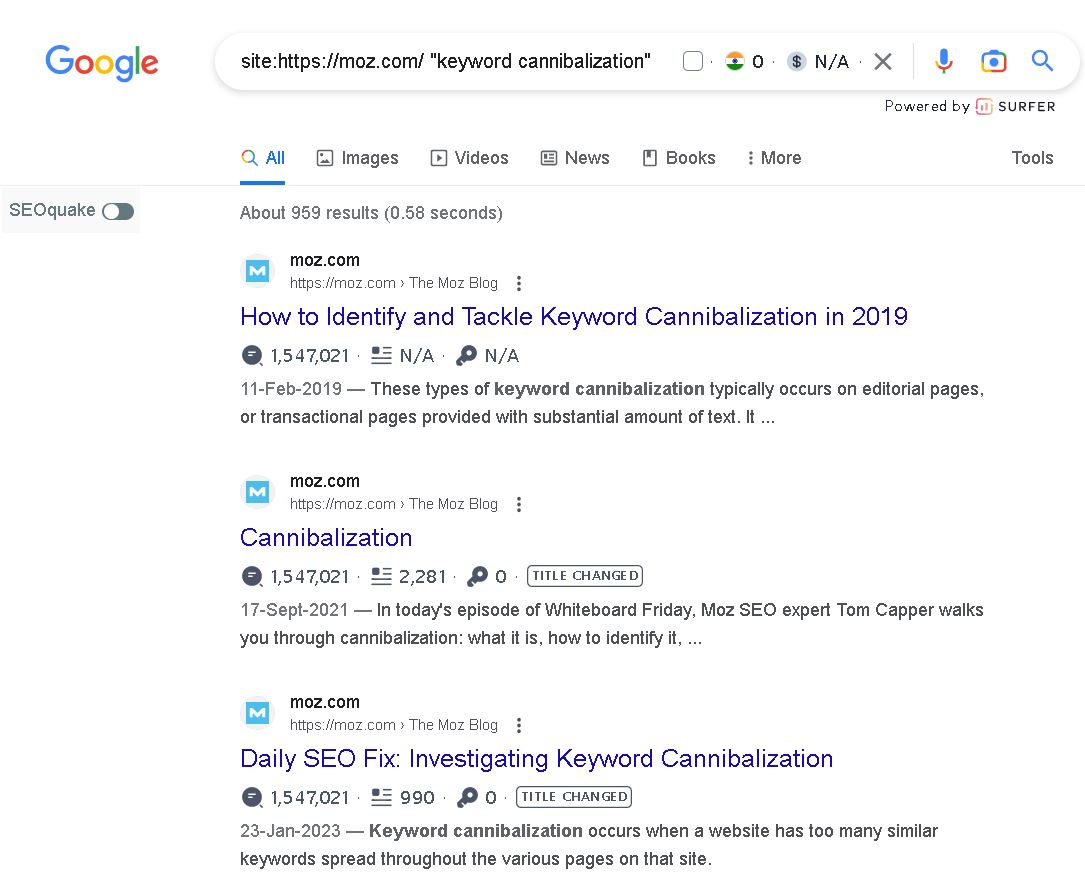5 Ways How To Find & Fix Keyword Cannibalization Issues
 Sakshi Salunke
Sakshi Salunke
When you are putting so much effort into targeting keywords, and link building, and still not getting any results. You become so frustrated and you end up putting in effort.
If this is the same problem you are facing right now, you may need to check if you are targeting the same keyword for many other articles.
Once you search for a keyword you are targeting and multiple pages of your website are ranking on the same keyword.
Your website is facing a major Keyword Cannibalization issue!
Well, I already faced this problem 5 months ago while I was working with one of my clients and I thought why not share how I identify and fix keyword cannibalization problem?
First, let’s understand what actually Keyword cannibalization means and how these 5 tactics that I’ve used will be effective to boost your ranking.
What is Keyword Cannibalization in Seo?
Keyword Cannibalization means multiple pages of the website are targeting the same keyword which competes with each other and does not help to rank on the Google search engine.
Let’s suppose, you are targeting the keyword “long tail keywords benefits” and you search on Google and you find different pages on your website ranking for the same keyword.
So the organic traffic you are getting also gets split and slows down the organic search performance.
Is Keyword Cannibalization Good?
Well, you must be thinking that your content is ranking on the same keyword which is good, but it’s BAD!
It actually hurts your search engine ranking and It confuses Google which page is relevant to rank for that particular keyword.
In the worst case, keyword cannibalization may trigger the issue called keyword stuffing.
How to identify keyword Cannibalization?
Luckily, it is really easy to identify and fix keyword cannibalization. There are a number of tools online available to find that can help you to tackle this issue. Let’s find out different ways I’ll show to fix it:
Run a Quick Google Search:
The easiest way to find keyword cannibalization is to go and search on Google. Search site:www.yourdomain.com “keyword” on the search bar and this will show you the results of your website page which are ranking on the specific keyword.
For example: if you search the site**:**www.moz.com “long tail keyword” you’ll find x number of results given below.

Use Keyword Research tools:
There are a number of Keyword research tools available online for you to choose from and help to find and fix keyword cannibalization, Using these tools, you will be able to generate in-depth reports about your website issues.
Also, it will be easier for you to target the right keyword for your content according to the intent of the content.
I suggest targeting long-tail keywords instead of only focusing on short keywords. Because long tails keywords are specific and easy to rank.
Here are some keyword Cannibalization checker tools that I recommend using it:
Use the Ahref Keyword Ranking Checker tool, that will show which domain is ranking for which keyword.
Go for a Free tool like Keylogs Keyword Cannibalization Tool
The TrueRanker tool will help you find in-depth statistics and analytics.
Content Audit:
After working on so much content and as a website owner, it is important to audit content from time to time.
To get the best result, you should perform a content audit after every 6 months to perform better on SERP. After getting performance stats and analytics metrics, check for the keyword position on which your content is ranking.
If you find two or more pages ranking for the same keywords. Here’s where you need to work and try to fix keyword cannibalization.
How to Fix Keyword Cannibalization?
Merge Content:
If you found your content ranking for the same keyword and also the content is conveying an almost similar message. I recommend merging your content. You may put all content on one single page.
This solution may not work in every situation, though users will have every information on a single page, and easier to rank on SERP.
Update content to make clear Intent:
Find competing content from the Keyword cannibalization tool mentioned above. I am suggesting changing the content or adding more content.
You can make your content’s keyword intent more clear. For example: If you have articles ranking on content targeting the keyword “long tail keyword”. You can make it more clear by targeting more specific keywords according to the intent.
In the first article, maybe the more relevant keyword would be the “long tail keyword” and another article’s relevant keyword would be the “long tail keyword advantage” So by this method, you can make content more clear.
Consolidating similar forms of content:
So this method is somewhat similar to merging content. But the only difference is collecting 3 to 4 pieces of content and merging it into a “Complete Guide” form.
For example:
How to start Keyword Research
How to do Keyword Research using Ahref
How to do Keyword Research for Free
The above-given titles are hypothetical posts, if you see the intent of all three post’s titles are somewhat similar. This is where you can consolidate your content and make it a long form of content “The Complete Guide to Start Keyword Research”
Keyword Cannibalization Solutions (I don’t Recommend)
Remove Keywords:
I know this is not the sensible solution when your content is important and is also ranking on SERP. But if you find your content is outdated. In this case, you can remove the keywords. This process is slow and takes time to show results. But you can consider this rarely recommended solution.
Put a No-index tag on that page:
Putting a No-index tag will tell search engines to not rank this page on Google. This is another simple solution and is rarely used. Again, I only recommend this solution only when you don’t want your content to rank anymore.
Conclusion
Fixing Keyword cannibalization is easy and is not rocket science! But you can use all of these above-mentioned methods according to how important your content is. Sometimes Google just gets confused about which content to rank on which keyword, but it’s our responsibility to check and audit websites from time to time to avoid major issues like keyword cannibalization.
I hope these solutions will be helpful for your website. For more SEO-related issues, please feel free to Follow & Subscribe to my mailing list.
Subscribe to my newsletter
Read articles from Sakshi Salunke directly inside your inbox. Subscribe to the newsletter, and don't miss out.
Written by

Sakshi Salunke
Sakshi Salunke
I'm SEO Executive and Content Writer with 1.5 years of experience combined. I'm currently working on 3 projects. Talking about content writing, I've written content related to E-commerce product descriptions, Articles, and Guest post articles. I started gaining knowledge about content writing and SEO 3 years ago. I want to help online businesses to be at the top of Google Search Results. Seeking opportunities, Let's Connect.